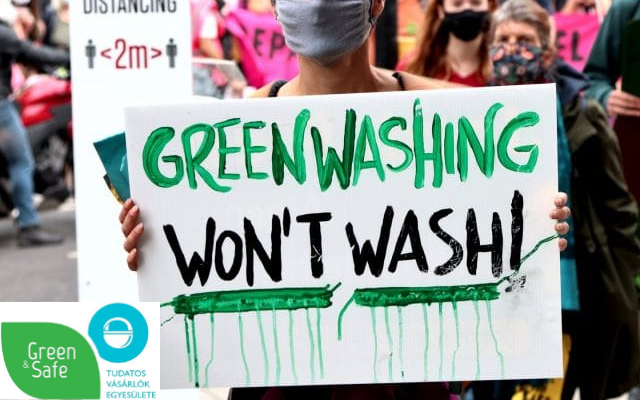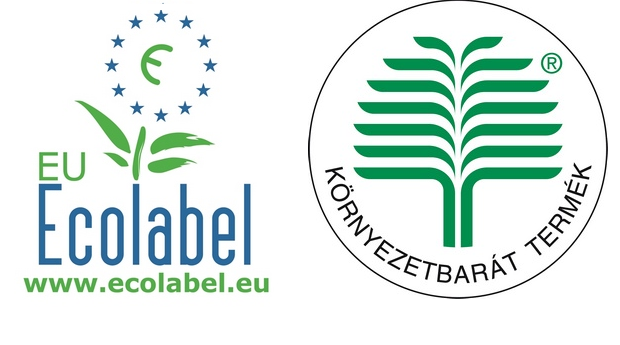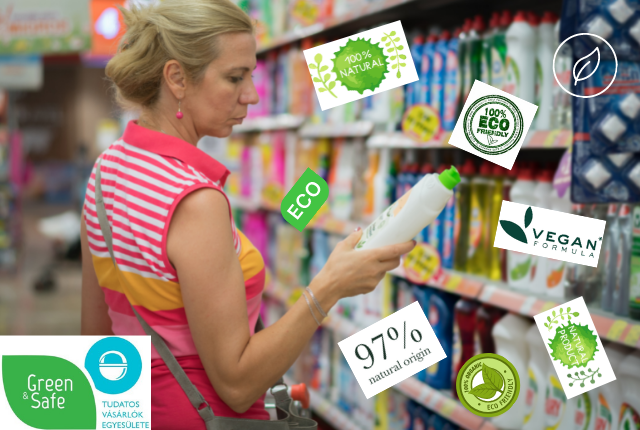
What is greenwashing and why is it an issue? The position of Conscious Consumers
Vegan, natural, sustainable, eco – consumers come across an awful lot of such logos and statements, everywhere. As the demand for environmentally friendly products is increasing, a growing number of companies are offering green or self-proclaimed ‘green products’. A significant part of such statements is exaggeration, disinformation and half-truth. We have collected what we, Conscious Consumers, consider greenwashing, why we think it’s wrong, and what we expect from businesses. Consumers should encounter green claims – but only authentic ones.
The Association of Conscious Consumers has been working for twenty years so that consumers can live a sustainable lifestyle in the future, and their demand for sustainable products and services would eventually force market players to change as well. We are convinced that if consumers en masse express their demand for sustainability and ethical corporate operations, companies will compete not only in terms of price and quality, but also in terms of environmental and social excellence.
The moment has now arrived: the market turnover of sustainable services and products has been increasing year by year, from banking services through transport alternatives and energy solutions to food and household goods – 85% of traders report an increase in the turnover of “sustainable” products. One of the reasons behind is that the most worrying issue for consumers, especially young consumers, is the state of the environment.
As the market reacts promptly to the growing green demand – freeriders emerge
As the proportion of consumers who want to shop according to certain principles, especially environmentally friendly aspects, is increasing, a growing number of companies wants to target them. Companies have been well aware that green messages have a positive effect on the recognition and turnover of their products. However, products aimed at more conscious consumers often only seemingly serve environmental protection purposes. There are often no concrete efforts or changes behind the impressive claims. These deceptive or false messages are collectively called greenwashing.
Most recently, we carried out a measurement on the domestic market of household cleaning products, and it turned out that
- within the cleaning products market only 1.7% of eco products holds an independent, third party eco-label certificate of the EU or an EU member state;
- 3.2% belong to those products that make some kind of environmentally friendly claim, text of visual reference to the product, but do not prove it. They are not certified by a third party or the claim itself is too vague or misleading.
More than half of the companies have greenwashed their products
According to a survey, more than half of American companies have admitted that they had practiced greenwashing, while two-thirds of global leaders are not even sure if their company’s sustainability efforts are real. In the European Union and in Hungary, almost half of the claims referring to environmentally friendly properties were found in surveys to be misleading in a way that violates the law, exhausting the concept of unfair commercial practice.
The confusion in consumers’ minds is exacerbated by the fact that
- there are more than 500 eco-labels of different quality and level of strength on the global market,
- and consumers spend an average of just 7 seconds (!) to decide on a product while shopping.
Therefore, the European Commission has been considering new regulations that would control the use of unprovable, vague and misleading environmental claims.
We overconsume anyway
Consumers’ sensitivity to environmental problems is skyrocketing, yet we already see that switching to “green consumption” alone will not be enough to alleviate the environmental crisis we are living. Recently, the number one priority is to promote behavioral change that has real environmental impact reduction. For this purpose, the Conscious Consumers have been supporting consumers in order to change their behavior when it comes to food consumption and household management, for more than a decade now.
We are convinced that one of the main barriers to behavioral change towards sustainable consumption is the information chaos surrounding sustainable solutions. It is quite clear from previous figures and numbers that
a sustainable lifestyle will not be promoted by more information, but by more accurate, properly validated information.
How do we, Conscious Consumers, define greenwashing?
Greenwashing is
- claiming, suggesting or keeping concealed
- about the environmental benefits or environmental impact
- of the product, business or initiative
- in visual or textual communication
- on the product or related to them (e.g. in advertising),
- which are suitable for influencing the decision of customers, investors or other stakeholders (e.g. employees)
- but which are not supported
- in an independent and verifiable, publicly comprehensible and easily accessible way for consumers.
A good example of this is when the green element of a particular product or service is promoted while the rest is ignored. For example, when a fast food chain switches to straws made from recycled paper, but still works with meat suppliers that are responsible for deforestation. This also includes the sustainable collections produced by fast fashion brands, or when the world’s largest company producing plastic toy elements promises to replace its plastic packaging with recycled paper by 2025.
Zöld címkék a csomagoláson: 4 igazi ökocímke, ami nem átverés
Why do we Conscious Consumers consider greenwashing harmful and risky?
The Association of Conscious Consumers consider greenwashing harmful and risky because:
- Misleading green claims may lead consumers to making wrong decisions while they believe they are making the right decisions.
- It normalizes our current level of consumption, which is not sustainable. Products and services that have been on the market for a few years in their current form suddenly appear as green. Consumers easily believe that everything is fine, that there is no need to fundamentally change their consumer habits – even though this is inevitable.
- It distracts our attention from the need for social dialogue and consensus aiming at reduced consumption. It prevents the launch of programs and real solutions aimed at this dialogue and consensus, since it seems that “there is an easier way”, moreover, it is so self-evident, since it is everywhere.
- It’s also bad for those businesses that have invested in truly green operations and the development of environmentally friendly products, because the benefits are skimmed off by bogus businesses making empty claims, thereby gaining an unfair competitive advantage. And good businesses are at a disadvantage compared to scammers.
- Greenwashing hinders the spread of truly green innovations, because it’s difficult to notice and find them in the noise of green communication. In addition, consumers can easily satisfy their sustainable lifestyle aspirations with the easy solutions at hand. They will not look any further. This also reduces the motivation to innovate for businesses that are striving for real environmental benefits.
- Consumer trust in environmentally friendly products with authentic certification is damaged: it is also to the detriment of those certification systems that prove real results and show validated claims, such as the EU Ecolabel and its equivalents in member states.
- And of course it’s bad for the planet
Our expectations for green communication on products and in their advertisements
1. Self-proclaimed green items? No, thanks!
 The fact whether a product is environmentally friendly and/or sustainable is a complex matter, which includes many sub-characteristics, from composition to packaging and fitness to use. Such description should only be used by those products, traders should only call those products environmentally friendly or sustainable, which have an independent, third-party certification that examines several essential properties of the product – such a certification is the EU Ecolabel. Sustainability does not imply only environmental sustainability, but also social and economic sustainability.
The fact whether a product is environmentally friendly and/or sustainable is a complex matter, which includes many sub-characteristics, from composition to packaging and fitness to use. Such description should only be used by those products, traders should only call those products environmentally friendly or sustainable, which have an independent, third-party certification that examines several essential properties of the product – such a certification is the EU Ecolabel. Sustainability does not imply only environmental sustainability, but also social and economic sustainability.
In case an independent, third-party product certification for the given product range does exist, we expect the manufacturer to certify the product if they wish to sell the item as environmentally friendly and sustainable. And if the manufacturer does not do so, they should not claim without any certification that the product is environmentally friendly, sustainable, climate neutral, etc.
2. Talk about the product itself
The communication of the company’s environmental efforts (in general) must be separated from the communication of the environmentally friendly features of the product. Do not put corporate communication on a product. The product should only have a statement about the product itself. Therefore, we do not think that it’s acceptable to communicate different corporate offsetting programs on products, because they can never be directly linked to a specific product. In addition, offsetting focuses on compensating environmental issues emerging during manufacturing process, instead of making efforts for prevention.
3. Make it clear
Green statements must be formulated in a clear and precise manner – how should customers know what the vague terms such as recycling, recycled paper exactly mean?… For example, it is not appropriate to say that the item is made of 100% recycled material, except for the cap, but the exact percentage should be stated. The green statement must not contain incorrect or only partially correct information. If there are special conditions for achieving the environmental advantage, e.g. the product decomposes only under certain conditions, these conditions must be communicated in the same way and place as the claim.
4. Highlight information on relevant properties only
Non-certificate-based green communication placed on products must focus on the essential properties of the product. A good example of the case is the ‘vegan comb’: zero animal ingredients is not an essential feature given for a 100% plastic hairbrush.
The communication of the environmental advantage should be in balance with the relevance of the feature: things that are unimportant in terms of the product’s life cycle and environmental impact should not be communicated ‘gloriously’. For example, if a fragrance in the product is certified organic, it should not be written in huge letters that it has an organic ‘lavender’ scent, because the fragrance component represents only an insignificant fraction of the product properties that produce an environmental impact.
5. Information should be available and clear
The explication of the green claim must be publicly available, in Hungarian, in a way that can be understood by the consumer. Detailed information should be available on the product. As long as the detailed information on the products is not available, the green claim must be verified by the manufacturer or the distributor upon request, in Hungarian, in accordance with the guidelines of the Hungarian Competition Authority (GVH):
‘Businesses must support the green claims they use with evidence, both to consumers and to the authorities. Green claims must be based on hard, independent and verifiable supported evidence that takes into account the latest scientific findings and methods.’ (Hungarian Competition Authority)
6. Do not talk ‘in general’
Manufacturers should not use the words ‘natural’ and ‘naturally’ in general, highlighted and en masse on the product, only in cases where this is justified by the ingredient or other product properties. These expressions should be used up to the point where the given product property is relevant in the context of all other properties. For example, water should not be counted among the ingredients in order to claim that the product contains 99% natural ingredients.

7. Stop using fake logos
The green communication, which is not based on independent certification by a third party, should be written on the product in text form. Do not use visual signs that look like a green mark or trademark!
8. Preference should be given to authenticity
Traders should prefer and highlight authentic, third-party certified environmentally friendly products.
9. With logo – without logo
At first glance, consumers should be able to distinguish between an authentically certified and a non-certified version of a brand. Products with and without environmental certification of the same brand should not look exactly the same and should not use exactly the same slogans and info.
10. What’s true now?
Green communication must be based on facts and results valid at the given moment, NOW. It’s not acceptable communicating ‘planned efforts’ on the product.
11. Do not highlight must-have features
Do not highlight a product feature that is required by law for all products in the given product category on the EU market (e.g. phosphate-free detergent), because this implies that the relevant product does not have an environmental advantage compared to other products.

Green&Safe LIFE-styles project is supported by the LIFE programme of the European Union and co-financed by the Hungarian Ministry of Agriculture. Project number: ENV GIE


